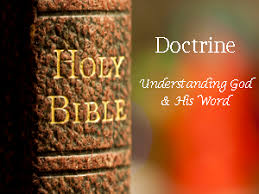The twentieth in a series of sermons
Series Theme
This series of sermon follow the articles of the Belgic Confession to present an bird’s eye view of the main doctrines of the Bible.
Readings reproduced on this page:
The Holy Bible: New International Version. 1996, 1984. Grand Rapids: Zondervan
Readings
Article 24: The Sanctification of Sinners
We believe that this true faith, produced in man by the hearing of God’s Word and by the work of the Holy Spirit, regenerates him and makes him a “new man,”57 causing him to live the “new life”58 and freeing him from the slavery of sin.
Therefore, far from making people cold toward living in a pious and holy way, this justifying faith, quite to the contrary, so works within them that apart from it they will never do a thing out of love for God but only out of love for themselves and fear of being condemned.
So then, it is impossible for this holy faith to be unfruitful in a human being, seeing that we do not speak of an empty faith but of what Scripture calls “faith working through love,”59 which leads a man to do by himself the works that God has commanded in His Word.
These works, proceeding from the good root of faith, are good and acceptable to God, since they are all sanctified by His grace.
Yet they do not count toward our justification__ for by faith in Christ we are justified, even before we do good works. Otherwise they could not be good, any more than the fruit of a tree could be good if the tree is not good in the first place.
So then, we do good works, but not for merit__ for what would we merit?
Rather, we are indebted to God for the good works we do, and not He to us, since it is He who “works in us both to will and do according to His good pleasure”60__ thus keeping in mind what is written: “When you have done all that is commanded you, then you shall say, `We are unworthy servants; we have done what it was only our duty to do.’”61
Yet we do not wish to deny that God rewards good works__ but it is by His grace that He crowns His gifts.
Moreover, although we do good works we do not base our salvation on them; for we cannot do any work that is not defiled by our flesh and also worthy of punishment. And even if we could point to one, memory of a single sin is enough for God to reject that work.
So we would always be in doubt, tossed back and forth without any certainty, and our poor consciences would be tormented constantly if they did not rest on the merit of the suffering and death of our Saviour.
- 2 Corinthians 5:17
- 58. Romans 6:4
- 59. Galatians 5:6
- 60. Philippians 2:13
- 61. Luke 17:10
Text
James 2:14–26 (NIV84)
14What good is it, my brothers, if a man claims to have faith but has no deeds? Can such faith save him?
15Suppose a brother or sister is without clothes and daily food.
16If one of you says to him, “Go, I wish you well; keep warm and well fed,” but does nothing about his physical needs, what good is it?
17In the same way, faith by itself, if it is not accompanied by action, is dead.
18But someone will say, “You have faith; I have deeds.” Show me your faith without deeds, and I will show you my faith by what I do.
19You believe that there is one God. Good! Even the demons believe that—and shudder.
20You foolish man, do you want evidence that faith without deeds is useless?
21Was not our ancestor Abraham considered righteous for what he did when he offered his son Isaac on the altar?
22You see that his faith and his actions were working together, and his faith was made complete by what he did.
23And the scripture was fulfilled that says, “Abraham believed God, and it was credited to him as righteousness,” and he was called God’s friend.
24You see that a person is justified by what he does and not by faith alone.
25In the same way, was not even Rahab the prostitute considered righteous for what she did when she gave lodging to the spies and sent them off in a different direction?
26As the body without the spirit is dead, so faith without deeds is dead.



